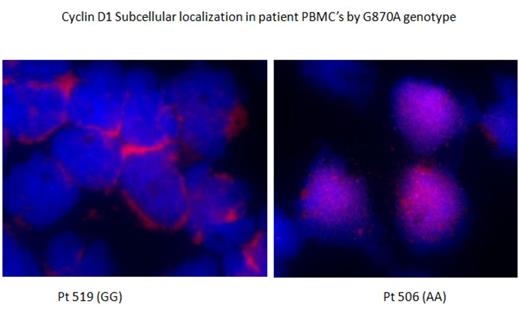Abstract
Previously, we reported that epigenetic therapy with cladribine, SAHA, and rituximab (SCR) for newly diagnosed mantle cell lymphoma was remarkably effective, with 100% overall response rate, 85-90% CR rate, and durable responses( Hasanali, AACR,2013 LBA140). Over 40 patients now have been enrolled with all patients completing therapy. Final response and CR rates will be reported at the meeting. This abstract will focus on the correlative studies performed as part of this trial.
Cladribine, a purine analog with reported epigenetic activity was shown here by HELP assays to inhibit DNA methylation in vivo in 6 patients with leukemic MCL. Similar activity was also observed in two MCL and two CLL patients treated with cladribine without vorinostat off trial, suggesting cladribine is a DNA hypomethylating agent. Due to cladribine's ability to inhibit the enzyme SAH hydrolase and thus inhibit the donation of methyl groups by S-adenosyl methionine (SAM), we assayed the ability of cladibine to inhibit histone methylation in vitro by Western blot analysis and in vitro assays of histone methyltransferase (HMT) activity on H3lys9 and H3lys27. Both assays demonstrated inhibition of methylated histones (Western) and HMT activity using MCL cell cells and nuclear extract at concentrations of cladribine in the 10-20 um range, higher than the in vivo concentration of 10-20 nm. These observations could be due to the lack of sensitivity of these assays, and more sensitive assays are in development.
Studies to help elucidate the mechanism of action of synergy of epigenetic drugs with the monoclonal antibody rituximab were performed. Using cells from patients with leukemic MCL treated with SCR, we assayed for characteristic changes of apoptosis using Western blotting and TUNEL assays. None were detected. We were unable to observe complement mediated cytoxicity in vitro using human serum and rituximab with added cladribine or vorinostat. With ADCC being the primary mechanism of presumed combined epigenetic and rituximab synergy, we investigated ADCC further. CD137 transcriptional upregulation was seen in several but not all treated patients, and some patients showed up regulation of perforin and granzyme mRNA by QRTPCR. An NK cell line, NKL, showed transcriptional upregulation of CD137 after treatment with cladribine and vorinostat.
The mechanism of resistance to SCR was studied in a patient with blastic, leukemic MCL. A 63 male achieved complete remission after two cycles of SCR. Subsequently, he developed neurologic symptoms and was found to have CNS disease. At autopsy, CD20+ disease was found in his CNS and CD20- disease was found systemically. A cell line was established from his peripheral blood that showed significantly reduced levels of CD20 mRNA. Treatment of these cells with a variety of epigenetic drugs was unable to upregulate CD20 mRNA. These cells have been in continuous culture for over 1 year and continue to show diminished levels of CD20 mRNA and protein. Epigenetic changes at the promoter are being studied by chromatin immunoprecipation (ChiP) assays.
No relevant conflicts of interest to declare.
Author notes
Asterisk with author names denotes non-ASH members.



This feature is available to Subscribers Only
Sign In or Create an Account Close Modal